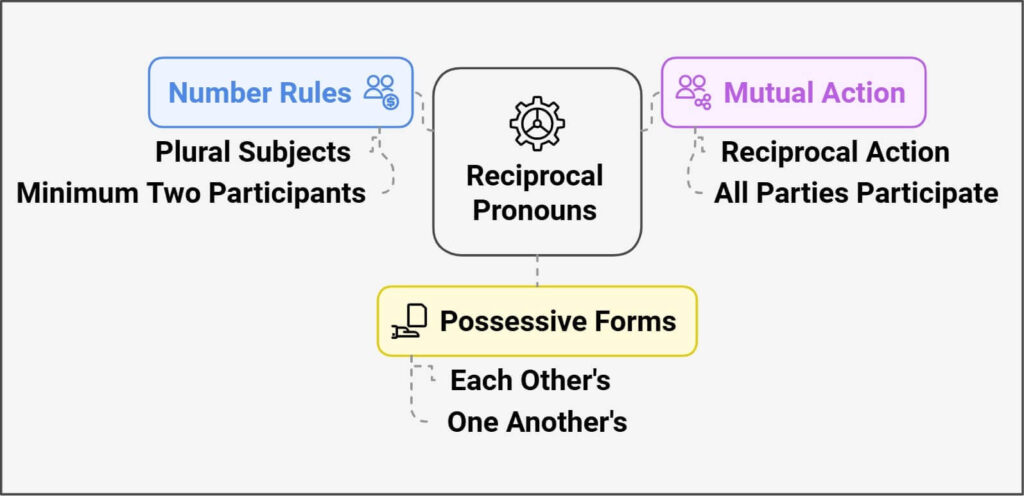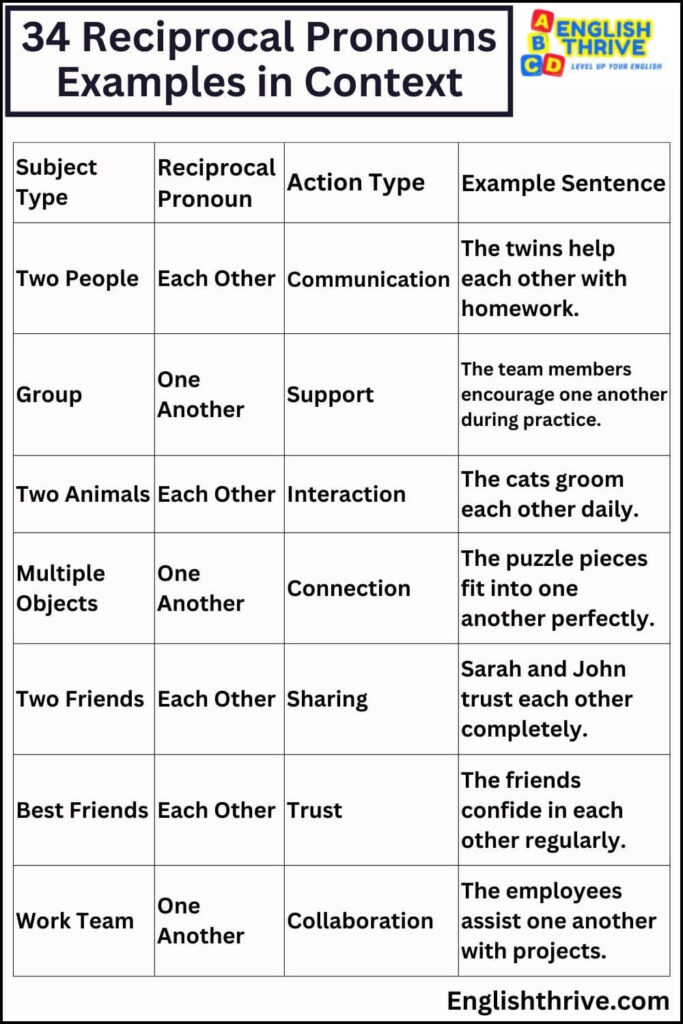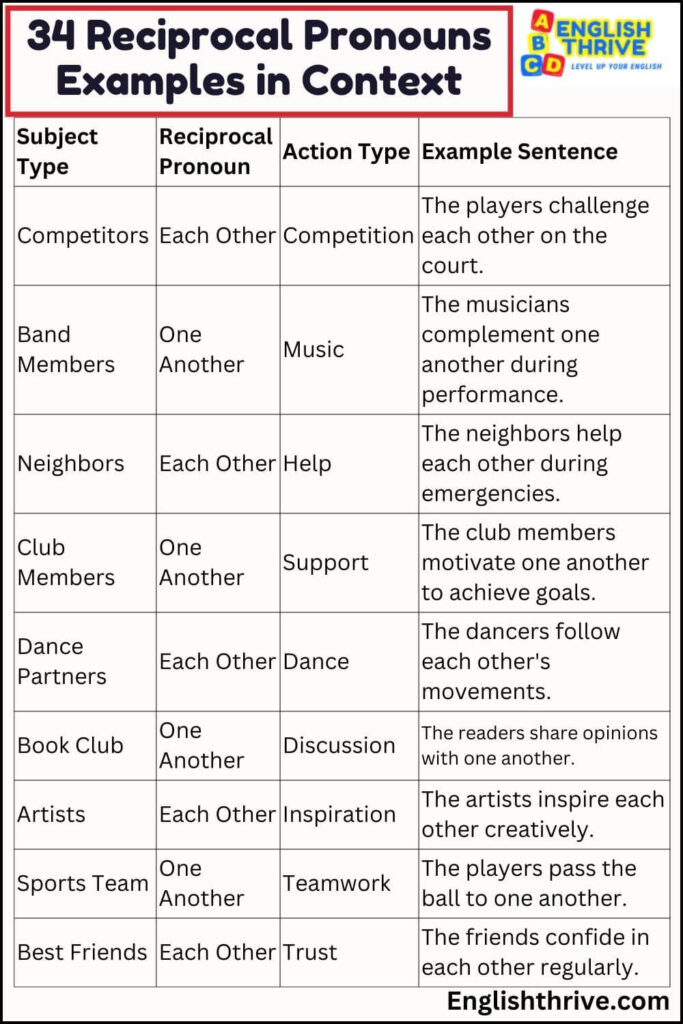Have you ever wondered when to use “each other” versus “one another”? Understanding reciprocal pronouns usage is key to describing mutual actions clearly. Let’s explore these special pronouns that show how people or things interact with each other. With 34 practical examples, you’ll master these pronouns and use them correctly every time.
Contents
ToggleUnderstanding Reciprocal Pronouns
Reciprocal pronouns are words we use to show mutual actions between two or more people or things. Think of them as partnership words – they help us describe actions that go back and forth between participants. English has two main reciprocal pronouns: “each other” and “one another.”
The Two Reciprocal Pronouns
- Each other (traditionally for two people/things)
- One another (traditionally for three or more)

Basic Rules for Using Reciprocal Pronouns
1. Number Rules
- Use for plural subjects only
- Must have at least two participants
2. Mutual Action
- Action must be reciprocal
- Both/all parties must participate
3. Possessive Forms
- Each other’s
- One another’s

34 Reciprocal Pronouns Examples
| Subject Type | Reciprocal Pronoun | Action Type | Example Sentence |
|---|---|---|---|
| Two People | Each Other | Communication | The twins help each other with homework. |
| Group | One Another | Support | The team members encourage one another during practice. |
| Two Animals | Each Other | Interaction | The cats groom each other daily. |
| Multiple Objects | One Another | Connection | The puzzle pieces fit into one another perfectly. |
| Two Friends | Each Other | Sharing | Sarah and John trust each other completely. |
| Team Members | One Another | Collaboration | The colleagues support one another at work. |
| Couple | Each Other | Affection | The couple loves each other deeply. |
| Study Group | One Another | Learning | The students teach one another new concepts. |
| Partners | Each Other | Business | The partners respect each other’s opinions. |
| Family Members | One Another | Care | The siblings look after one another when parents are away. |
| Competitors | Each Other | Competition | The players challenge each other on the court. |
| Band Members | One Another | Music | The musicians complement one another during performance. |
| Neighbors | Each Other | Help | The neighbors help each other during emergencies. |
| Club Members | One Another | Support | The club members motivate one another to achieve goals. |
| Dance Partners | Each Other | Dance | The dancers follow each other’s movements. |
| Book Club | One Another | Discussion | The readers share opinions with one another. |
| Artists | Each Other | Inspiration | The artists inspire each other creatively. |
| Sports Team | One Another | Teamwork | The players pass the ball to one another. |
| Best Friends | Each Other | Trust | The friends confide in each other regularly. |
| Work Team | One Another | Collaboration | The employees assist one another with projects. |

FAQ on Reciprocal Pronouns
1. How do you identify reciprocal pronouns in a sentence?
To identify reciprocal pronouns:
- Look for phrases “each other” or “one another”
- Check if there’s a mutual action involved
- Verify that there are plural subjects or multiple participants
- Ensure the action goes both/all ways
Example: “The sisters help each other with homework.”
- Plural subject: sisters
- Mutual action: helping
- Action goes both ways
2. What’s the difference between “each other” and “one another”?
Traditionally, the rule was:
- Use “each other” for two people/things
- Use “one another” for three or more
However, modern English accepts both forms interchangeably. Choose based on:
- Personal preference
- What sounds more natural
- Style guide requirements
3. Can reciprocal pronouns be used with singular subjects?
No, reciprocal pronouns always need plural subjects because they show mutual actions. For example:
- Incorrect: “The person helped each other.”
- Correct: “The people helped each other.”
4. How do you form possessives with reciprocal pronouns?
Add ‘s to form possessives:
- Each other’s
- One another’s
Example:
- “They borrowed each other’s books.”
- “The team members respected one another’s ideas.”
5. When should you NOT use reciprocal pronouns?
Avoid reciprocal pronouns when:
- The action isn’t mutual
- There’s only one subject
- The action only goes one way
- You’re describing self-reflection (use reflexive pronouns instead)
Conclusion
Understanding reciprocal pronouns usage helps you describe mutual actions clearly and accurately. Remember that these pronouns always need plural subjects and mutual actions. Whether you choose “each other” or “one another,” make sure the action flows between participants. Practice these examples in your writing, and you’ll master these useful pronouns in no time.

